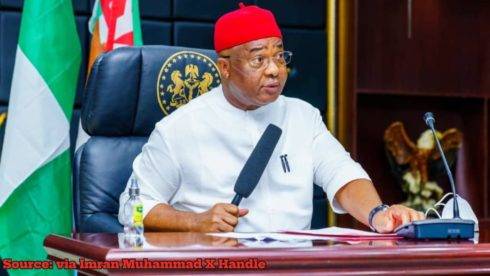The Federal Government through the Minister of Works, David Umahi has announced a significant revision to the Lagos-Calabar Coastal Highway project, reducing the number of lanes from eight to six. This decision aims to ensure the project’s completion and alleviate concerns about its feasibility. Despite the reduction in lanes, the government remains committed to delivering a high-quality infrastructure project.
The Minister of Works, David Umahi, confirmed that the first 47 kilometers of the project will be open to the public by May 2025. He emphasized that the government has allocated N10 billion as compensation for property owners affected by the project’s development. This demonstrates the government’s dedication to ensuring that the project is completed without undue delays or disputes.
Federal Government: Compensation for Property Owners
The Federal Government has allocated a total of N10 billion as compensation for property owners impacted by the demolitions required for the development of the Lagos-Calabar Coastal Highway. This move demonstrates the government’s commitment to ensuring that affected individuals and communities are fairly compensated for their losses. The Minister of Works, David Umahi, confirmed that the compensation has been paid in full, with no outstanding debts.
The minister praised the contractor for their commitment to the project and their reasonable approach to the work. He emphasized that the project is an investment that will yield returns, including the recovery of the cost of the project within 10 years. This highlights the government’s focus on delivering infrastructure projects that benefit the economy and the people.
Federal Government: Project Progress
Despite earlier concerns about the project’s progress, the Minister of Works, David Umahi, confirmed that over four kilometers of concrete road has been completed on six lanes. He emphasized that the project is moving smoothly, with a new alignment established to address concerns from MTN and the Okuaja community. This demonstrates the government’s ability to adapt and overcome challenges to deliver critical infrastructure projects.
The minister also confirmed that sections three and four of the project have been finalized, with stakeholder engagement set to take place in Cross River or Akwa Ibom to ensure procurement. This highlights the government’s commitment to transparency and community engagement in the delivery of infrastructure projects.
Federal Government: Economic Benefits of Lagos-Calabar Coastal Highway
The Lagos-Calabar Coastal Highway project is expected to have significant economic benefits, including the creation of jobs, stimulation of economic growth, and increased access to markets. The minister emphasized that the project is an investment that will yield returns, including the recovery of the cost of the project within 10 years. This highlights the government’s focus on delivering infrastructure projects that benefit the economy and the people.
The project’s completion is expected to boost economic activity in the region, with the potential for increased tourism, industrial development, and trade. The government’s commitment to delivering this project demonstrates its dedication to driving economic growth and development in Nigeria.
Unleashing Progress: Federal Government’s N10 Billion Compensation Fuels 6-Lane Lagos-Calabar Highway Mega-Project
The Federal Government through the Minister of Works, David Umahi has announced a significant revision to the Lagos-Calabar Coastal Highway project, reducing the number of lanes from eight to six. This decision aims to ensure the project’s completion and alleviate concerns about its feasibility. Despite the reduction in lanes, the government remains committed to delivering a high-quality infrastructure project.
The Minister of Works, David Umahi, confirmed that the first 47 kilometers of the project will be open to the public by May 2025. He emphasized that the government has allocated N10 billion as compensation for property owners affected by the project’s development. This demonstrates the government’s dedication to ensuring that the project is completed without undue delays or disputes.
Federal Government: Compensation for Property Owners
The Federal Government has allocated a total of N10 billion as compensation for property owners impacted by the demolitions required for the development of the Lagos-Calabar Coastal Highway. This move demonstrates the government’s commitment to ensuring that affected individuals and communities are fairly compensated for their losses. The Minister of Works, David Umahi, confirmed that the compensation has been paid in full, with no outstanding debts.
The minister praised the contractor for their commitment to the project and their reasonable approach to the work. He emphasized that the project is an investment that will yield returns, including the recovery of the cost of the project within 10 years. This highlights the government’s focus on delivering infrastructure projects that benefit the economy and the people.
Federal Government: Project Progress
Despite earlier concerns about the project’s progress, the Minister of Works, David Umahi, confirmed that over four kilometers of concrete road has been completed on six lanes. He emphasized that the project is moving smoothly, with a new alignment established to address concerns from MTN and the Okuaja community. This demonstrates the government’s ability to adapt and overcome challenges to deliver critical infrastructure projects.
The minister also confirmed that sections three and four of the project have been finalized, with stakeholder engagement set to take place in Cross River or Akwa Ibom to ensure procurement. This highlights the government’s commitment to transparency and community engagement in the delivery of infrastructure projects.
Federal Government: Economic Benefits of Lagos-Calabar Coastal Highway
The Lagos-Calabar Coastal Highway project is expected to have significant economic benefits, including the creation of jobs, stimulation of economic growth, and increased access to markets. The minister emphasized that the project is an investment that will yield returns, including the recovery of the cost of the project within 10 years. This highlights the government’s focus on delivering infrastructure projects that benefit the economy and the people.
The project’s completion is expected to boost economic activity in the region, with the potential for increased tourism, industrial development, and trade. The government’s commitment to delivering this project demonstrates its dedication to driving economic growth and development in Nigeria.
Federal Government: Stakeholder Engagement in the Lagos-Calabar Coastal Highway Project
The Federal Government has emphasized the importance of stakeholder engagement in the delivery of the Lagos-Calabar Coastal Highway project. The Minister of Works, David Umahi, confirmed that stakeholder engagement will take place in Cross River or Akwa Ibom to ensure procurement for sections three and four of the project. This demonstrates the government’s commitment to transparency and community engagement in the delivery of infrastructure projects.
Stakeholder engagement is critical to ensuring that the project meets the needs of local communities and stakeholders. The government’s commitment to engagement highlights its dedication to delivering projects that benefit all Nigerians.
Federal Government: Project Timelinecritical to Ensuring that the Government’s Infrastructure Goals Are Met
The Federal Government has announced that the first 47 kilometers of the Lagos-Calabar Coastal Highway project will be open to the public by May 2025. This demonstrates the government’s commitment to delivering the project on schedule. The minister emphasized that the project is progressing smoothly, with a new alignment established to address concerns from MTN and the Okuaja community.
The project’s timeline is critical to ensuring that the government’s infrastructure goals are met. The minister’s confirmation of the project’s progress and timeline highlights the government‘s dedication to delivering critical infrastructure projects that benefit all Nigerians.
The Federal Government has emphasized the importance of stakeholder engagement in the delivery of the Lagos-Calabar Coastal Highway project. The Minister of Works, David Umahi, confirmed that stakeholder engagement will take place in Cross River or Akwa Ibom to ensure procurement for sections three and four of the project. This demonstrates the government’s commitment to transparency and community engagement in the delivery of infrastructure projects.
Stakeholder engagement is critical to ensuring that the project meets the needs of local communities and stakeholders. The government’s commitment to engagement highlights its dedication to delivering projects that benefit all Nigerians.
Federal Government: Project Timelinecritical to Ensuring that the Government’s Infrastructure Goals Are Met
The Federal Government has announced that the first 47 kilometers of the Lagos-Calabar Coastal Highway project will be open to the public by May 2025. This demonstrates the government’s commitment to delivering the project on schedule. The minister emphasized that the project is progressing smoothly, with a new alignment established to address concerns from MTN and the Okuaja community.
The project’s timeline is critical to ensuring that the government’s infrastructure goals are met. The minister’s confirmation of the project’s progress and timeline highlights the government’s dedication to delivering critical infrastructure projects that benefit all Nigerians.
Table of Contents
Discover more from OGM News NG
Subscribe to get the latest posts sent to your email.














